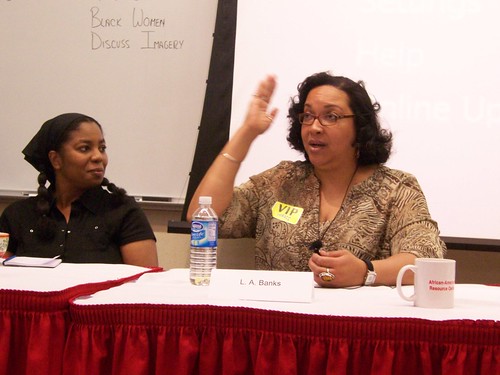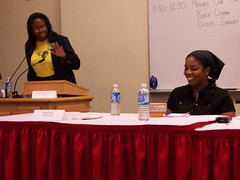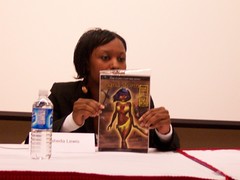East Coast Black Age of Comics Convention, Pt. 3: "Having Our Say: Black Women Discuss Imagery"

Cheryl Lynn Eaton (Digital Femme, The Ormes Society) and L.A. Banks (Vampire Huntress)


Moderator Stephanie Brandford and Cheryl Lynn Eaton; Rashida Lewis "Sand Storm") talks about the cover of her book
In February of this year, comics writer Cheryl Lynn Eaton founded The Ormes Society to celebrate and promote the work of black women comics creators and professionals and to reach out to black women comics readers. The Society is named for pioneer Zelda "Jackie" Ormes, currently considered to be the first syndicated African-American woman cartoonist. The Society started with about 13 members but is now 20 strong and growing. As Cheryl Lynn explained in her blog:
Black women are out there creating, but unlike our peers, we have the tendency to create in a vacuum... . How can I have the nerve to be irritated by how sites devoted to black creators are dominated by men and books with superhero themes (and on occasion, "hot" black model threads) if I never add my own contributions? How can I be irked by the fact that none of the members of the sites devoted to women in comics commented on the dearth of brown-skinned girls as characters in the MINX line if I never registered on those boards to make a post about that topic in the first place?The Ormes Society would be a bit of a stepping stone or gateway. It'd be a place where black female comic creators and fans could (1) find each other (2) share our creations (3) talk about topics that are important to us and (4) gain the courage needed to bring those thoughts and creations to the larger comic reading/creating audience. It would also be a place for editors, fans and fellow creators to find us and share their thoughts about our work and about topics that pertain to black women in comics (both in the pages and behind the scenes).
The above photos are from a May 19 panel at the East Coast Black Age of Comics Convention in Philly, "Having Our Say: Black Women Discuss Imagery." The discussion was steered by the fantastic Stephanie Brandford, who also moderates the Dwayne McDuffie VHive comics forum under the name mutate20. (Also note Stephanie's awesome "Invisible Universe" T-shirt). The below are some key quotes from my hand-scribbled notes on the panel:
1. So what's the problem?
Stephanie Brandford began the panel by showing a 8-minute series of video clips she had compiled of depictions of black women characters in speculative fiction movies, including Storm (X-Men), Gail (Sin City), Joy (Children of Men), Niobe (Matrix movies), Akasha (Queen of the Damned) and various others. Most of the characters were in minor or supporting roles, with a few exceptions.
Brandford then prefaced her first question by explaining that as someone with an engineering background, she would take a problem-solving approach in her role as moderator. She then asked the panelists to describe what they saw as the problem (with both the relative lack of substantial roles given to black women in both film and comics.):
- Rashida Lewis said that black women characters were "too few, and too one-dimensional", adding "We can always use a few more sisters holding things down in comic books.
- L.A. Banks referred to the film clips, saying that for the most part "either we died in the first 30 seconds of the flick, or we were in roles that were powerless." Said Banks: "I wanted to have some young heroes that look like my daughter."
- Cheryl Lynn Eaton agreed: "It's black women as perpetual sidekick. We need to hear from more women's voices. And it would be nice to see some books geared toward us."
2. Solutions?
- RL: "Write to the publishers!"
- LAB: Banks strongly agreed. "One letter is considered to be like 100 responses." She emphasized that the bottoms line for publishers and the film industry is money. "You need to understand how this works economically... . The late great Octavia Butler never made the New York Times bestseller list. Vote at the box office!"
- CLE: "Speak up with your pen, with your wallet. Write to the messageboards."
3. Root Cause?
- SB: "How can creator be encouraged to improve the portrayals of black women?"
- RL: "I think I see a movement, our own little Renaissance." She added that "There should be good characters on both ends of the spectrum" (Note: I believe she meant the spectrum of mainstream to independent comics publishing).
- LAB: Banks emphasized economics again. She said racism was obviously a huge problem in the industry, but "the economics moves a lot of that stuff out of the way." She also encouraged readers who wanted to support black women creators and characters to buy across genres, from horror and science fiction to comics and mainstream literature, and not just to stick with their favorite genres. "If you don't buy across the board, you won't have [black] mysteries, [black] science fiction. Just urban lit and 'women's fiction.'"
- CLE: Eaton addressed creators of all backgrounds with her answer. "When you create, think that no child want to pick up a book and feel that they are less than any other group, no child wants to feel left out." She also commented on the small but significant attempts at diversity being made by mainstream comics publishers. "The comics companies are scared so you see them making little tentative changes... They don't put the effort into them."
She added that when a small attempt at adding characters of color failed to have huge success, publishers often used that as an excuse not to try again. ("Oh, we already tried that.") What was really needed was "characters of all races, all backgrounds. They really have to make the effort and the commitment."
- LAB: Banks changed the topic slightly and talked about some of the tactics she has used to make her series of Vampire Huntress novels so successful. She mentioned that while she puts out a new book every six months, she also posts 10-20 page unique "in-between" stories for free on her website and MySpace to keep readers coming back. Her readers send the stories around and tell all their friends, which builds sales for the books when they eventually come out.
4. What would an ideal state look like?
- RL: "There should be a gazillion small companies putting out what needs to be said, however they need to get the truth out. When you tell your own truth, people follow."
- LAB: In an ideal world "every major publishing house would be giving Anne Rice dollars to people writing speculative fiction." She said that 60% of all paperback sales are romance novels, and that publishers tend to put all the money and promotions and good distribution deals into a few big authors. "They're all putting Danielle Steele in her Rolls Royce. There's a huge pay disparity."
- CLE: "Utopia? I'm so used to just fighting for the most minute recognition. Just to walk into a comic book store and see a diverse range."
- RL: Talked about how there is often a defensive backlash against comic book creators of color: "When you do start bringing things to the light, people get upset." She said she had gotten a lot of negative reactions to making the main characters in her Sand Storm comic books, which are set in ancient Egypt, black instead of fititng into the "Elizabeth Taylor" white Cleopatra that so many people are comfortable with.
5. Question from the audience: "What can you do as an artist to reverse stereotypes of black women as either video hos or asexual "mama" or "mammy" caricatures?"
- RL and LAB both talked about how they had dealt with the sexuality of their characters, trying to avoid stereotypes and create a balance between their characters beauty, intelligence and sexuality--powerful women with moral codes who nonetheless owned their own sexuality.
- CLE felt that black women aren't necessarily seen as very sexual in mainstream comics, and that they were often background characters while all kinds of male superheroes fought over white women characters. "You have to fight and say black women ARE desirable, black women are beautiful. [In the mainstream comics] We're like handmaidens to Kitty Pryde and Jean Grey, backdrops to Wonder Woman."
5. Question from the audience: "Who is your favorite character and why?"
- RL "White Tiger." [Note: a Latina character in Marvel comics] She also mentioned how much she loved Sigourney Weaver in Aliens.
- LAB Sin City's Gail, played by Rosario Dawson.
- CLE "Misty Knight." [Note: Knight was one of the first substantial black women characters in mainstream comics. A few days after the panel, Eaton writes in her blog that she was horrified to see the latest cover of the comics series starring Misty Knight, which shows Knight and her friends drawn in a ridiculous porn style and being molested by tentacles. See PW Beat for more.]
6. Question from the audience from a white man who wanted to know if there were any special rules or guidelines for a white person depicting characters of color.
- The panelists basically agreed that everyone in comics should be encouraged to create smart, sensitive and substantial characters of color, and that while there were no special rules or guidelines it was important to approach such characters respectfully and try to do proper research.
- CLE Eaton added: "Fans are going to complain regardless. As long as you've done your research, don't worry about what they say."
7. Question from the audience from a librarian who works with a lot of young black women in the Bronx and wanted to know if there were any particular books she should try to acquire for her library.
- The panelists had trouble coming up with books with black women characters appropriate for young girls, basically lamenting the serious lack of such books in comics. CLE suggested that one good choice might be Aya by Marguerite Abouet and Clément Oubrerie, a graphic novel based on Abouet's experience as a teenage girl growing up in the Ivory Coast in the 1970s.
That's all, folks. Don't forget to visit The Ormes Society and Digital Femme for more on this topic.
See "East Coast Black Age of Comics, Part 1: The Glyph Awards" and "ECBACC Photo Outtake" and Part 2: The Conventionfor more extensive commentary, photos and notes on ECBACC.
P.S. You know you want to buy Masheka's book. And mine. And see us on tour! Right? Thought so.
Labels: african-american, appearances, black, cartoons, comics, conventions, events, feminism, race and racism, women




1 Comments:
You may want to check out www.sustah-girl.com. Cassandra Washington and I, Turtel Onli, created a serious one-shot book called "Sustah-Gril, Queen of the Black Age. It dealt with a lot of the issues you are addressing as absent. We are in the process of reviving the title. Plus Onli Studios has alwasy worked with Black Women in positions of real power as creators, adminstrators, adn more. In Chicago that is how we flow. I regret the sexist BS of my other brothas..
Visit www.dablackage.blogspot.com.
Post a Comment
Subscribe to Post Comments [Atom]
<< Home